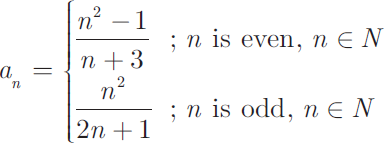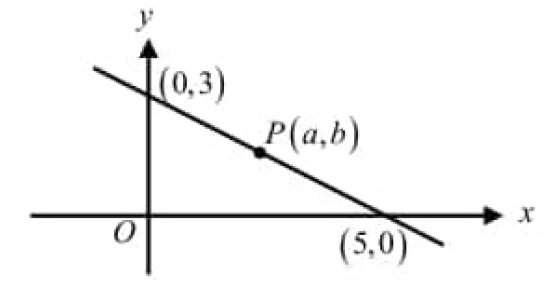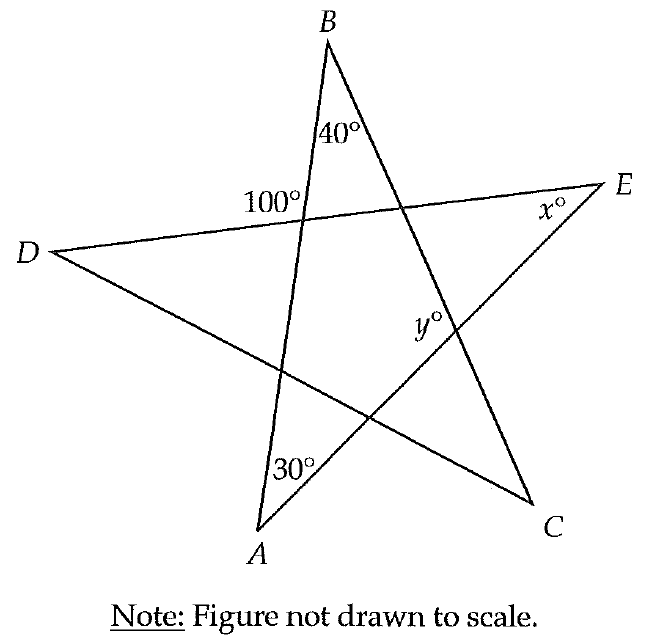FINDING THE INDICATED TERM OF A SEQUENCE
Question 1 :
Find the indicated terms of the sequences whose nth terms are given by
(i) an = 5n / (n + 2); a6 and a13
Solution :
To find a6, we have to apply 6 instead of n.
To find a13, we have to apply 13 instead of n.
|
an = 5n / (n + 2) n = 6 a6 = 5(6)/(6 + 2) = 30/8 a6 = 15/4 |
an = 5n / (n + 2) n = 13 a13 = 5(13)/(13 + 2) = 65/15 a13 = 13/3 |
(ii) an = -(n2 - 4); a4 and a11
Solution :
To find a4, we have to apply 4 instead of n.
To find a11, we have to apply 11 instead of n.
|
an = -(n2 - 4) n = 4 a4 = -(42 - 4) a4 = -(16 - 4) = -12 |
an = -(n2 - 4) n = 11 a11 = -(112 - 4) a11 = -(121 - 4) = -117 |
Question 2 :
Find a8 and a15 whose nth term is

Solution :
In a8, 8 is even in a15, 15 is odd
|
an = (n2 - 1)/(n + 3) a8 = (82 - 1)/(8 + 3) = (64 - 1)/11 = 63/11 |
an = n2/(2n + 1) a15 = 152/(2(15) + 1) = 225/(30 + 1) = 225/31 |
Question 3 :
If a1 = 1, a2 = 1 and an = 2an - 1 + an - 2 n ≥ 3, n ∈ N, then find the first six terms of the sequence.
Solution :
First and second terms are 1.
an = 2an - 1 + an - 2
|
n = 3 an = 2an - 1 + an - 2 a3 = 2a3-1 + a3-2 a3 = 2a2 + a1 a3 = 2(1) + 1 a3 = 3 |
n = 4 an = 2an - 1 + an - 2 a4 = 2a4-1 + a4-2 a4 = 2a3 + a2 a4 = 2(3) + 1 a4 = 7 |
|
n = 5 an = 2an - 1 + an - 2 a5 = 2a5-1 + a5-2 a5 = 2a4 + a3 a5 = 2(7) + 3 a5 = 17 |
n = 6 an = 2an - 1 + an - 2 a6 = 2a6-1 + a6-2 a6 = 2a5 + a4 a5 = 2(17) + 7 a5 = 41 |
Hence the first 6 terms are 1, 1, 3, 7, 17, 41.
Kindly mail your feedback to v4formath@gmail.com
We always appreciate your feedback.
©All rights reserved. onlinemath4all.com
Recent Articles
-
Digital SAT Math Problems and Solutions (Part - 134)
Apr 02, 25 12:40 AM
Digital SAT Math Problems and Solutions (Part - 134) -
SAT Math Resources (Videos, Concepts, Worksheets and More)
Apr 02, 25 12:35 AM
SAT Math Resources (Videos, Concepts, Worksheets and More) -
Digital SAT Math Problems and Solutions (Part 135)
Apr 02, 25 12:32 AM
Digital SAT Math Problems and Solutions (Part 135)

